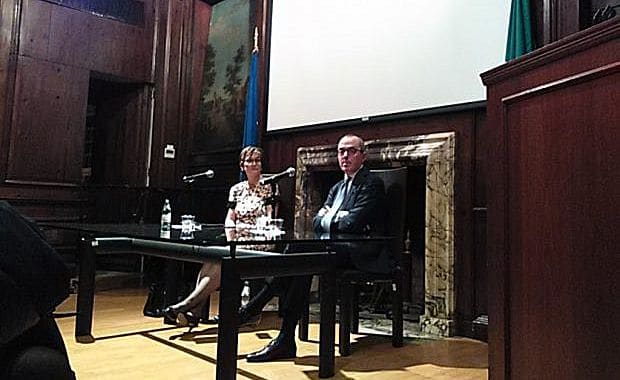
Bristo-Myer Squibb top manager Giovanni Caforio in conversation at the Italian cultural institute on 9 March.
Giovanni Caforio, managing director of Bristol-Myer Squibb, guest of the Cultural Institute for the series of meetings "Managers, from Italy to top global businesses", talked about the excellence of the Italian pharmaceutical industry: "Italian managers are an asset for multinationals"
Of Federico Di Pasqua – 20 Mar 2017 – Science and Health
The success of "Managers: from Italy to top global businesses”: the series of meetings dedicated to the excellence of our country's human capital. Guest of honor at the appointment on 9 March was Giovanni Caforio, managing director of the pharmaceutical multinational Bristol-Myer Squibb.
The review, hosted by the Italian Cultural Institute of New York, is the result of the collaboration between the cultural center of Park Avenue and the Italian Consulate. Moderating the meeting was Maria Teresa Cometto, journalist and author, who guided the conversation making use of her experience as a New York correspondent for various Italian publications. Among those present were the consul Francesco Genuardi and the director of the institute Giorgio Van Straten, who introduced the event and recalled its importance for the Italian community on this side of the ocean.
 Caforio has been managing Bristol-Myer Squibb since 2015, whose current structure is the result of the merger, which took place in 1999, with the Belgian company Janssen Pharmaceutica. The group, specialized in the research and production of treatments in the field of oncology and cardiovascular diseases, has established itself on the international scene as one of the most powerful pharmaceutical companies in the world. But the US giant – 25,000 employees for a turnover that exceeded sixteen billion dollars in 2016 – has deep ties with our country. Directed for five years by Lamberto Andreotti, CEO of Bristol-Myers until 2015, the group tells stories of success and Italian excellence.
Caforio has been managing Bristol-Myer Squibb since 2015, whose current structure is the result of the merger, which took place in 1999, with the Belgian company Janssen Pharmaceutica. The group, specialized in the research and production of treatments in the field of oncology and cardiovascular diseases, has established itself on the international scene as one of the most powerful pharmaceutical companies in the world. But the US giant – 25,000 employees for a turnover that exceeded sixteen billion dollars in 2016 – has deep ties with our country. Directed for five years by Lamberto Andreotti, CEO of Bristol-Myers until 2015, the group tells stories of success and Italian excellence.
“Italian executives represent a assets for multinational companies,” explained Caforio, referring to the example of Renzo Canetta, former vice president of the Bristol-Myer oncology research group. Canetta's work resulted in the introduction of as many as 18 new drugs for fight against cancer: an extraordinary result in an industry where on average the introduction of a new treatment requires several years of research, often unsuccessful.
In addition to boasting a significant number of compatriots among its employees, in 2012 the company promoted the collaboration with the National Institute for the Study and Treatment of Tumors Fondazione G. Pascale of Naples. "Our country boasts a scientific ecosystem of the highest level" says Caforio defining that of the Federico II University of Naples "one of the best oncology research centers in the world". But why has the number of patents reached historic lows in a country that trains talented researchers? When asked, Caforio explains how the lack of collaboration between university research centers and companies prevents the efficiency of the pharmaceutical industry in our country.
The discussion about a topic as current as that of health can only wonder about the role of the institutions. When asked about the new US administration, the otherwise impeccable Caforio blurts out admitting that the repeal of the affordable care act (better known as Obamacare) “will have a profound impact on the access to health care of American citizens.”
A forest of raised hands accompanied the conclusion of the speech. The Park Avenue audience, very attentive to the manager's speech, had rather eloquent questions, wondering about the "ethical doubts" and the "social sustainability" of a fundamental – and controversial – industry such as the pharmaceutical one. The most frequent question for the Italian manager was which is the most sustainable economic system to guarantee access to treatment: the European one, which mainly promotes public health, or the neoliberal US one. “I don't want to give a politically correct answer,” Caforio commented diplomatically, “but both systems have positive and negative aspects.”
Ed.: Giovanni Caforio MD, 51, Chief Executive Officer and Director,Bristol-Myers Squibb Company, received total compensation of $15,640,437 in fiscal year 2015 [source Bloomberg]





